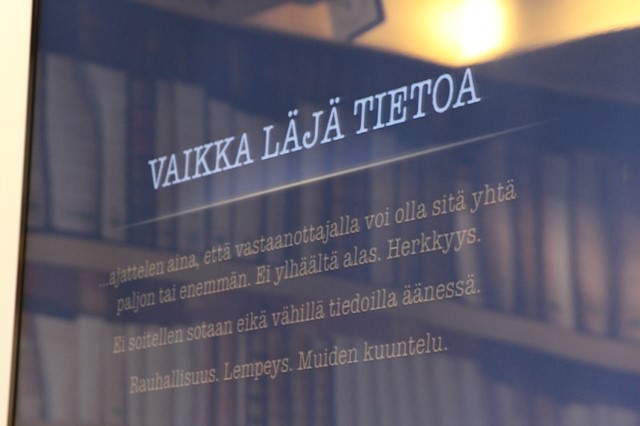As the amount of information increases, the continuous updating of outdated information seems quite impossible with outmoded methods. Could someone from our new age of enlightenment make better decisions with the help of artificial intelligence (AI)?
What would you do if you came across new persuasive information challenging your earlier beliefs? Would you change your opinion?
I guess the majority would answer in the affirmative. However, political scientists Brendan Nyhan and Jason Reifler observed in their experimental studies that very few people in fact would act in that way. Those with particularly strong ideological convictions proved to be almost bulletproof when it came to information that was in conflict with their view of the world. Actually, in their case, it was noted that challenging erroneous information led to even stronger commitment to false conceptions. Nyhan and Reifler referred to the phenomenon as the backfire effect.
A strong commitment to ideologies turned out to be a disturbing factor also in Philip Tetlock’s research project, where ordinary people challenged professionals in predicting geopolitical events. After studying the most successful “super-forecasters”, as he dubbed them, Tetlock noted that they all had certain cognitive abilities and personality characteristics which helped them to succeed. First of all, the super-forecasters were pragmatic. They respected different opinions and assimilated them as part of their own estimations. Second, they continuously updated their information and regularly changed their assessments as new facts emerged. Moreover, the super-forecasters turned out to be self-critical. They considered their beliefs as hypotheses to be tested and not as treasures to be protected.
In the bestseller Superforecasting: The Art and Science of Prediction, based on his research project, Tetlock highlights the fact that even though the best “Mr and Mrs Average forecasters” beat even the best experts they were not superhuman. Anyone ready to correct one’s cognitive and knowledge-related biases by employing analytical thinking and intellectual curiosity can improve his/her ability to make estimations about the future.
Information is proliferating – how about our understanding?
As people of the information era, we should have unprecedented opportunities to make use of diverse information to back up our thoughts, assessments and decisions. But has increased information led to better decisions or to discussions which are based on facts and are of better quality?
On the contrary, it would seem that the end result has been growing uncertainty. Apart from the increase in knowledge, the amount of unreliable information and of all kinds of poppycock has also grown enormously. The constant information overload has made it more difficult for us to separate fact from fiction, reality from impressions or the meaningful from the meaningless. To a certain extent, we have ended up in the situation the sociologist Jean Baudrillard predicted several decades ago: reality has been replaced by empty signs without meaning.
Moreover, has anyone got the time to assimilate the information produced in support of decision-making? The Finnish economist Sixten Korkman complained in a recent radio interview that political decisions too often are not based on researched knowledge. When the going gets tough, knowledge-based decision-making is steamrollered by stereotypical problem-solving methods. It seems the most important thing is to make decisions regardless of their content.
New Age of Enlightenment
It seems unlikely that the reality is as dark as I describe it above. Regardless, our attitude towards information and knowledge does need some kind of updating. The constant increase in information is so fast that we will need new ways to classify, rank in importance and utilise that information. I have even played with the thought of a new period of enlightenment.
The Age of Enlightenment, which is strongly connected to the 18th century, was the starting point of the modernisation process for the whole modern era. It was at that time that the spiritual foundation for the modern world was created. Science advanced in huge leaps, the amount of knowledge increased and thinking was liberated from the chains of religion. At the same time, knowledge was classified in a novel way. The ambitious aim of the first encyclopaedias was to try to map the entire field of human knowledge.
People who felt they had been freed from ignorance and were living in the era of enlightenment made up the core of the Enlightenment. Does the core of the enlightenment of our information age consist of people who feel that they have been liberated from information and disinformation overload by knowledge harnessed for their benefit with the help of machines?
I am not a technology devotee, but regardless I find it interesting to contemplate how advancing artificial intelligence could make our everyday life easier by helping us use information in more diverse ways and to increase our understanding. Machines will never replace our thinking ability, but artificial intelligence, at its best, could help us overcome some cognitive limitations and aberrations in human thinking. As David Ferrucci, one of the developers of IBM’s Watson artificial intelligence, has put it:
“I think it’s going to get stranger and stranger for people to listen to the advice of experts whose views are informed only by their subjective judgement. Human thought is beset by psychological pitfalls, a fact that has only become widely recognized in the last decade or two. So what I want is that human expert paired with a computer to overcome the human cognitive limitations and biases.”




Recommended